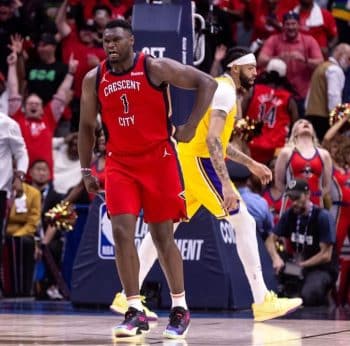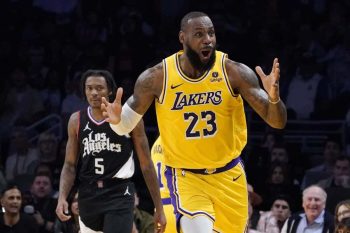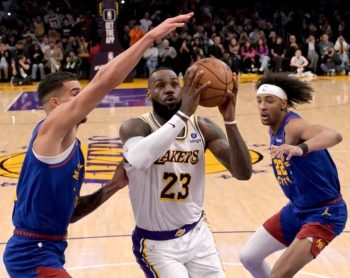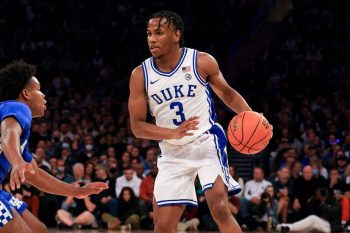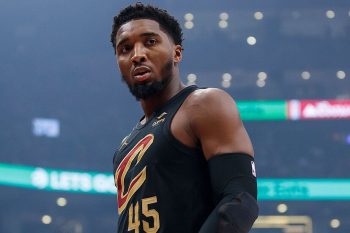NBA
NBA Sunday: HEAT Owe Dwyane Wade

From sea to shining sea. From the sunny shores of South Beach to the Pacific Northwest in Portland, the National Basketball Association features an array of teams from all corners of the country.
Just as diverse as the geographic makeup of the team’s that comprise the league are the way they choose to do business.
Dwyane Wade is to the Miami HEAT what Kobe Bryant is to the Los Angeles Lakers, Tim Duncan is to the San Antonio Spurs and Paul Pierce was to the Boston Celtics.
And as each respective player encroached upon the final years of their respective careers, their situations were handled as differently possible.
With reports of Wade poised to opt out of the final year of his contract, there is growing concern in Miami that he may have played his final game as a member of the Miami HEAT.
What seemed to once be a foregone conclusion is now an uncertain proposition.
* * * * *
In 2013, with the franchise contemplating life after Bryant, the Lakers seemed to make a rather curious decision in offering the all-time great a two-year extension worth $48.5 million. Sure, Kobe was Kobe, but he had certainly seen his best years pass him by. Why pay him such a hefty sum knowing that his on-court productivity was not likely to match?
It didn’t take a rocket scientist to figure out that the Lakers wanted to “take care” of Bryant and reward him for helping to lead the franchise to seven NBA Finals appearances over the course of his first 14 years in the league.
Typically, in the NBA, players are paid on promise. In a world still heavily marked by future guaranteed contracts, hefty contracts are doled out, most often, as an advance payment on what lies ahead.
Instead, with Bryant, the Lakers rewarded his past accomplishments.

With over $224 million in career earnings, Duncan trails Bryant’s $280 million by a wide margin, but as the two each ride off into their respective sunsets, the argument cannot be made that Duncan is still the more productive contributor. At 39 years old, Duncan has just completed his 18th season in the NBA, yet is just one year removed from being a dominant force for the 2014 NBA Champions. Even more surprising is the fact that, even at 39 years old, Duncan was named an All-Star for the 15th time this past season and was named to the All-NBA Third Team.
Back in 2012, with the Spurs still hoping to capture their fifth NBA Championship, Duncan re-signed with the club on a three-year deal worth $36 million. At the time, despite his advanced age, the prevailing sentiment was that the contract was far below market value. For Duncan and the Spurs, though, that had become the norm. Duncan, unlike Bryant, had routinely left money on the table in pursuit of winning championships. Clearly, it worked.
And although Paul Pierce, does not come close to boasting the championship pedigree that Bryant and Duncan do, he has emerged as a trans-generational player for the NBA’s most winningest franchise.
In the end, it got Pierce nothing, as, against his will and desire, he was ultimately traded away for assets by general manager Danny Ainge. The edict for Ainge was to stockpile assets for the franchise’s rebuild. There was no reward for Pierce after his 15 years, two Eastern Conference Championships and one NBA title in Boston. Instead, there was a trade to Brooklyn.
Three of his predecessors have been handled quite differently and if Wade polls each, they would probably have different advice for him.
Bryant would probably tell Wade that he deserves a retirement package and that he should fight for it.
Duncan would undoubtedly encourage him to leave money on the table in pursuit of future success.
Pierce would remind him that the NBA is a business, and that while loyalty is great, it is often a one-way street that is traveled more often by players than front offices.
As Dwyane Wade and the Miami HEAT reportedly head toward July 1 with uncertainty surrounding them, it is one of the league’s more compelling storylines.
* * * * *
Do the HEAT owe Wade? In a world where NBA owners reap billions of dollars worth of benefits on the backs of their players, what merits a hefty salary? Should it be about nothing more than what the player is capable of in the future? Or should consideration for past performance be considered?
Therein lies the fork in the road that divides the NBA’s modern superstar from his front office counterparts. Today, more than ever, when someone like Pierce is traded or someone like Duncan is asked to sacrifice money for the good of the franchise, they often do so in the name of “winning” and of “being a team player.” What often gets lost in those situations is the fact that the owners of the respective franchises reap financial benefits in direct correlation to what is given up by the player.
We quickly remind players that “the NBA is a business,” yet scoff at Bryant and even Carmelo Anthony for not leaving money on the table. It is a double-standard and a battle against perception that NBA players have long fought and long lost.
Now, it is Wade’s turn to fight the battle.
Wade has brought the Miami HEAT franchise to heights that Rony Seikaly, Glen Rice, Alonzo Mourning and Tim Hardaway could only dream. Before Wade, the HEAT wondered what it would be like to be NBA Champions. With Wade, they discovered that pleasure, three times over.
About 12 years ago, with the world’s attention on LeBron James and a young Serbian named Darko Milicic leading the way, the 2003 NBA Draft was one of the more anticipated in recent memory.
Now, 12 years later, it can be said with certainty that it will ultimately go down as one of the deepest drafts in history. When it is all said and done, Wade will go down as not only being the second best player in the class, but the best in his franchise’s history and one of the best, ever.
Secretly, as Milicic, Anthony and Chris Bosh rounded out the top four, Pat Riley watched intently, hoping that Wade would fall into his lap.
He did, and as they say, the rest is history.
* * * * *
“To sum up the evening, at least for us, we feel like we have one of the best players in the draft, if not the best,” Pat Riley said on the night the HEAT drafted Wade. “He is one of the most mature guys that I have ever met and he is from a great college program. What I was most impressed by when I really studied him, aside from him being a great defender, is his explosiveness and ability to get to the rim and score. We are excited about him and feel like he is going to be a great asset and a great player for us.”
Despite entering the league with questions about his size and whether or not he could excel as a combo guard in the NBA, Wade joined a core in Miami that was a healthy mix of veterans and fellow youngsters. He joined Caron Butler and Rasual Butler as the neophytes and hoped to help Eddie Jones, Lamar Odom, Samaki Walker and Brian Grant bring the HEAT back to respectability. The hope for the HEAT was that Wade could be the pivot that the team needed to go from being the 25-57 team they were before him to once again being a contender.
His rookie-year averages of 16.2 points, four rebounds and 4.5 assists per game helped the HEAT earn the fourth seed heading into the 2004 Eastern Conference Playoffs, and it was his performance therein that made Wade a household name across the NBA.
With Game 1 knotted at 79-79, Stan Van Gundy saw victory—and the home court advantage that his team had—hanging in the balance. He entrusted the team’s fate into the sure hands of the 22-year-old rookie, and Wade did not disappoint. With Baron Davis standing in front of him, Wade dribbled with his right hand as Davis jawed at him. Behind the three-point line, Wade envisioned himself getting into the paint and shooting a floater—a move that we now know is his signature.
Wade faked right and reverse-dribbled the ball between his legs. With his head down and going full-speed to his left, Wade had two steps on trailing Davis, who saw his life flash before his very eyes. Wade stopped abruptly at the free-throw line, and although Davis was almost underneath his shirt, he was on Wade’s hip and could offer little resistance. Jamal Magloire closed the gap on Wade, but Wade saw him coming, stopped on a dime, and floated up a shot which he has now converted thousands of times over the course of his career.
It found the bottom of the net and the HEAT found a Game 1 victory in a series in which they would ultimately prevail after seven games.
It was just the beginning of what would lie ahead for Wade and the HEAT.
Thereafter, as his feud with Kobe Bryant reached the point of no return, Shaquille O’Neal hand-picked Wade to be his desired running mate. Without Wade, there would have been no O’Neal in Miami and there probably would not have been a 2006 NBA Championship.
Indeed, Wade led O’Neal and his cast of veterans to the franchise’s first title, and just two years later, with Jerry Colangelo having assumed the helm for USA Basketball, Wade would plant the seeds for future success in Miami.
Charged with revamping the national team, Wade was amongst a star-studded cast that was sent to China in an attempt to recapture the gold medal that the United States failed to win at the 2004 Olympics in Greece. Dubbed the “Redeem Team,” Wade joined the likes of Jason Kidd, Chris Paul, Dwight Howard, Bryant and the two that would eventually join him in Miami two years later.
Wade was one of three players on the Redeem Team to have a championship ring, but, at that time, he was the only one who had been named the Most Valuable Player of an NBA Finals. He also happened to have a bond with James, Bosh and Anthony, and it was during that summer that the idea of forming a “super team” was born.
In June 2010, it was Wade who implored Riley to do everything necessary to free up the cap space to make a legitimate run at James and Bosh. The prospect of James leaving Cleveland to team up with Wade in Miami was difficult to imagine, but it was an opportunity that Riley thought too good to pass up, even if a long shot.
The final piece of the puzzle for the HEAT materialized when they struck a deal with the Oklahoma City Thunder on the night of the 2010 draft. In a move rarely seen in the NBA, the HEAT traded out of the first round of the draft in order to preserve cap space. First round picks comes with guaranteed salary slots, so sending the 18th overall pick to the Thunder along with Daequan Cook made little sense at the time since the HEAT only received the 32nd overall pick in the draft in return.
But a few weeks later, after Wade and Riley emerged from the Decision as the victors, it made all the sense in the world.
* * * * *
After making four straight trips to the Finals and five in total, the franchise still operated with a small market mentality. Fears of the luxury tax saw Mike Miller waived and Joel Anthony traded for loose change. With the conference becoming stronger and their place at the top threatened, in 2014, Wade opted out of the final two years of his contract, leaving $41 million on the table.
The move was made with the intention of allowing the HEAT the same flexibility they had in 2010 when James, Bosh and Miller agreed to sign. This time, however, James made a different decision. In the end, Wade re-signed with the HEAT on a two-year deal worth $31 million. In effect, in an attempt to help the franchise bring in more talent, Wade lost $10 million. That he also lost James made it a lose-lose proposition.
Now, at 33 years old, the sun is setting on Wade’s career. Still productive and still spry in spurts, with his cache and know-how, Wade could still command a maximum salary on the open market, even if not fully guaranteed.
In all likelihood, what he would like from the HEAT is a little payback. He sacrificed money for the franchise twice over, both in 2010 and 2014. One final three-year deal in the $50 million range seems fair, all things considered.

Wade has been the cornerstone for the HEAT since he was drafted in 2003. As he approaches the end of his career, the idea that he should be taken care of is certainly reasonable. As the calendar turns toward July 1, though, that is not the way the HEAT seem poised to play it.
It seems far-fetched to think things won’t get worked out between the two sides, but as we recount how similar situations have played themselves out with Bryant, Duncan and Pierce, we should all keep things in perspective and be surprised by nothing.
To this point, Wade has been a HEAT lifer. He can boast being personally responsible for lifting the franchise from the cellar into being a perennial contender. He has delivered on all of his potential and promise and has helped Riley solidify his legacy as a basketball mastermind.
Now, Wade wants what he feels he is due—just a little payback.
To some, this idea of rewarding a player for past performance seems asinine and backwards, but those same individuals have no knowledge or understanding of the economic impact that Wade has single-handedly had on South Florida or the HEAT franchise.
Today more than, ever, NBA superstars understand that professional basketball, from sea to shining sea, is big business.
As we approach July 1, in what has become a rare event, one of the league’s mainstays and most valuable contributors is acting like it. Indeed, the NBA is just a business. And if Wade does end up wearing a different uniform next season, it is important that we all remember that.
